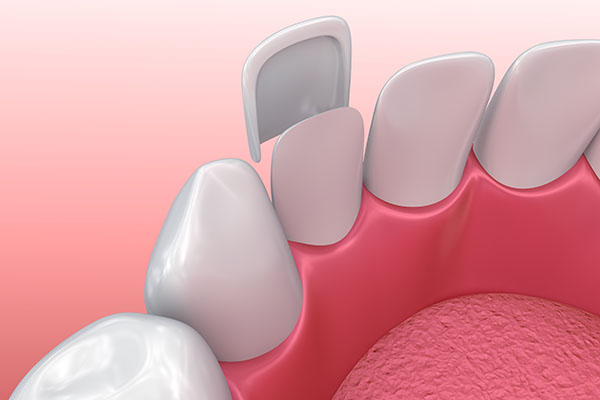 Dental veneers are made of porcelain or composite resin material. The shells cover the front surface of a patient's front teeth and can be used to change the size, shape, or color of teeth. These restorations have been used for years to transform smiles, but some may wonder about their permanency. There are several reasons to remove veneers and more than one option for replacing them as well.
Dental veneers are made of porcelain or composite resin material. The shells cover the front surface of a patient's front teeth and can be used to change the size, shape, or color of teeth. These restorations have been used for years to transform smiles, but some may wonder about their permanency. There are several reasons to remove veneers and more than one option for replacing them as well.
Reasons to remove veneers
According to the American Dental Association, placing veneers is considered an irreversible procedure. Because some enamel is removed, the teeth will always require some type of restoration over them. However, there are times when patients need or desire to have veneers removed. The most common concerns are cavities under the veneers or aesthetic dissatisfaction.
Recurrent decay
Due to the margin between the veneer and the natural tooth, cavities can form around the restoration. The margin can become a ledge on which plaque and bacteria collect. Once the dentist diagnoses recurrent decay around a restoration, it often has to be removed so the underlying tooth can be treated.
Staining or cracking
Some veneers can last for years. However, over time, the porcelain or resin surface becomes stained, and patients may be concerned about how the teeth look. A traditional teeth whitening agent is not effective on porcelain or resin; it can actually etch the surface. The shells may also become chipped or cracked over time. In these situations, removal and replacement are often necessary.
Options to replace veneers
While veneers are an irreversible restoration, this does not mean that replacement is impossible. Once a tooth is prepared for the treatment, it becomes slightly smaller than before. Therefore, the patient needs to cover it with some type of restoration.
New veneers
If a patient has been pleased with veneers and is simply ready for a new set, replacement shells can be an option. In this situation, the existing caps are removed, and new ones are cemented in place. In some cases, the dentist may be able to perform this treatment in only one or two office visits. The patient can choose a new shade for the shells if desired.
Full coverage crowns
If a patient experiences recurrent decay under a veneer, a full-coverage crown may be the next logical step. Unlike a veneer that covers the front surface of the tooth, a crown covers the entire tooth. Like veneers, these can be customized for the size, shape, and color that the patient prefers. Depending on how many teeth are being treated, a combination of veneers and crowns may be used.
Conclusion
Dentistry has come a long way in recent years, and more patients than ever can have a smile to be proud of. Veneers can last for a long time when properly cared for, but patients should be aware of what to do when problems arise. In this way, patients can make an informed decision about their oral health.
Request an appointment or call North Coast Dental Implants & Cosmetics at 760-705-3407 for an appointment in our San Marcos office.
Related Posts
Veneers can improve a patient’s smile in many ways by covering up imperfections in teeth with natural-colored shells. Staining on front teeth is one of the most popular reasons patients choose this type of restoration. People who have lived with discolored teeth can feel uncomfortable smiling in public, and other treatment options may not be…
There are numerous cosmetic procedures to improve someone’s smile, and veneers are a popular option. There are two types of veneers: Porcelain and composite. Both are used for minor cosmetic issues such as discolored teeth, cracks or chips, gaps between teeth, and worn-down enamel.Porcelain is used more often as there are numerous benefits, but this…
Veneers are artificial shells placed over natural teeth to conceal damage, such as discoloration or chips. Patients often invest in this type of dental restoration to create whole, even smiles that foster self-confidence. When considering any treatments to improve a smile, many patients want solutions that last. For many patients, veneers can offer a long-lasting…
